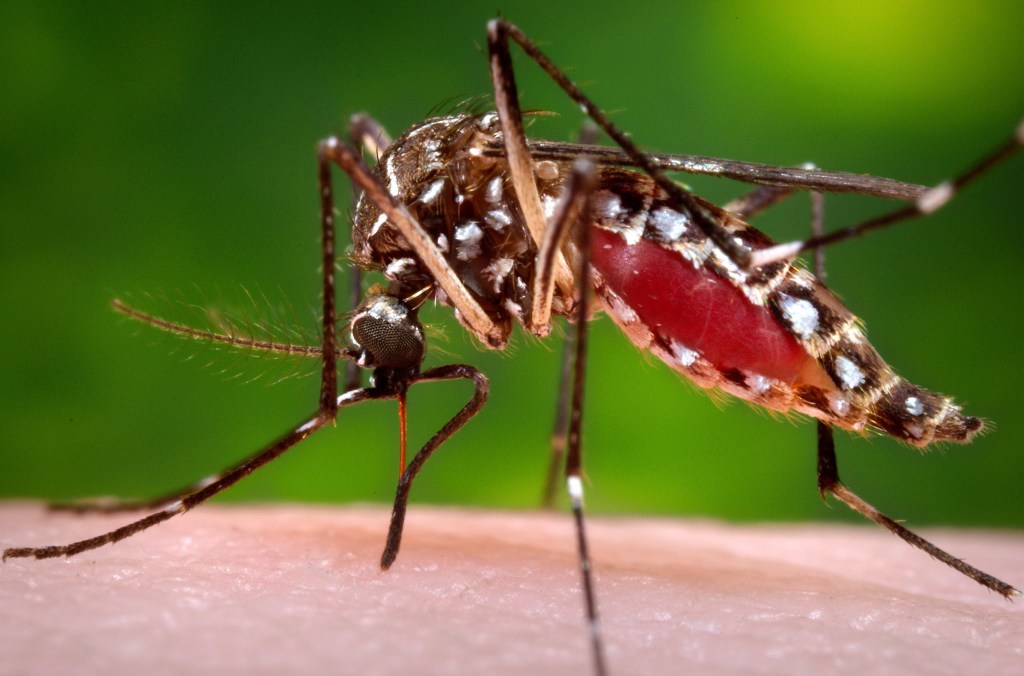Discovery of more dangerous and highly aggressive Aedes aegypti mosquitos near a San Jose cemetery has Santa Clara County officials imploring residents to remove standing water and give access to pest-control crews so the insects don’t becoming a permanent menace.
The invasive mosquitos can transmit dengue, yellow fever and other serious diseases, and also threaten “our way of life” because of their voracious feeding on human blood can take place in the middle of the day, unlike the state’s native mosquitos, the county warned in a Friday press release.
“It feeds almost exclusively on humans and does not fly long distances, venturing fewer than 500 feet from where it hatches,” the county said.
Many of California’s native mosquitos are most active in morning and evening, when temperatures are cool, while Aedes aegypti bite any time of day.
Even a small number of Aedes aegypti “can become an extreme nuisance,” according to the California Department of Public Health.
As with other mosquito species, only females do the biting, and Aedes aegypti goes after people outdoors and indoors. One will feed on a person multiple times, according to the county’s Vector Control District. “They are known as ‘ankle biters’ because they tend to bite humans around the ankle,” the district said.
The black-and-white-striped mosquito, about a quarter-inch long, was first found in Santa Clara County in 2022, and this year has been identified in neighborhoods in San Jose, as well as in Santa Clara and Gilroy, where county crews are using pesticide to try to eradicate them. Aedes aegypti has been identified in Contra Costa County — twice this year — Santa Cruz County in 2022 and in Solano County, where it has an established population, according to county and state records. It was found in San Mateo County in 2013 but has not been seen there since 2015. The species was also found in Alameda County about a decade ago but is believed not to be established.
The insects are known to transmit dengue — often called “bone-break fever” because of its painful symptoms — plus chikungunya, yellow fever, and Zika.
Although California residents sometimes acquire those diseases outside the country, so far, only dengue has been transmitted by mosquitos in the state, with two cases last year and five this year, all in Los Angeles County, according to the state public health department.
Cedars Sinai hospital, responding to the Los Angeles County cases, noted that global warming “expands the reach” of disease-carrying mosquitos.
Aedes aegypti “is known to invade new territories through transportation of containers that are contaminated with the mosquito eggs,” the Santa Clara County Consumer and Environmental Protection Agency said.
The insects are “container breeders” that prefer to lay eggs inside water-filled containers or on stems of plants growing in water, the agency said. The eggs can survive for a year, even dried — they hatch when wet again, the agency said.
“They will lay eggs in a container as small as a bottle cap,” the agency said.
The public “plays a critical role in controlling the spread of this mosquito,” Santa Clara County said.
County officials asked residents to scour their property for “even the smallest amount of standing water,” and dump it out. “Cleaning and scrubbing bird baths, pet dishes and other containers is a good way to remove any lingering Aedes aegypti eggs, which are about half a millimeter in size and look to the naked eye like tiny bits of dirt,” the county said.
Rain barrels, cisterns and irrigation drains should be screened with fine mesh, and residents should fix leaky outdoor faucets and broken sprinkler heads, the county advised.
Two Aedes aegypti mosquitos were found near Oak Hill Memorial Park, a large cemetery about three miles south of downtown San Jose, Santa Clara County said Friday. Vector Control District staff “are carrying out a thorough eradication plan in the surrounding area, trapping adult mosquitoes, inspecting properties to find mosquito larvae and habitat … and treating any larvae they find with pesticide,” the county said.
“The district will escalate its mosquito-control methods as needed to include methods such as backpack spraying and wide area larvicide spraying, which is done with the use of truck-mounted equipment and will be conducted in a series of treatments. Control methods can also be escalated to include adult-mosquito-control treatments if necessary.”
Edgar Nolasco, director of the county Consumer and Environmental Protection Agency urged residents in affected areas to “cooperate with district staff and allow them to inspect their properties for mosquitoes and mosquito habitat.”
Meanwhile, the City of Fremont on Saturday said county authorities had been receiving reports of “aggressive daytime-biting mosquitoes in Fremont.” However, although the insects are “incredibly irritating and make outside unappealing,” they are a native-to-California species, Aedes dorsalis, and do not transmit diseases to humans. San Mateo County has reported that the goldish-colored Aedes dorsalis “can be a major pest to humans” and “aggressively bites during the day.”
